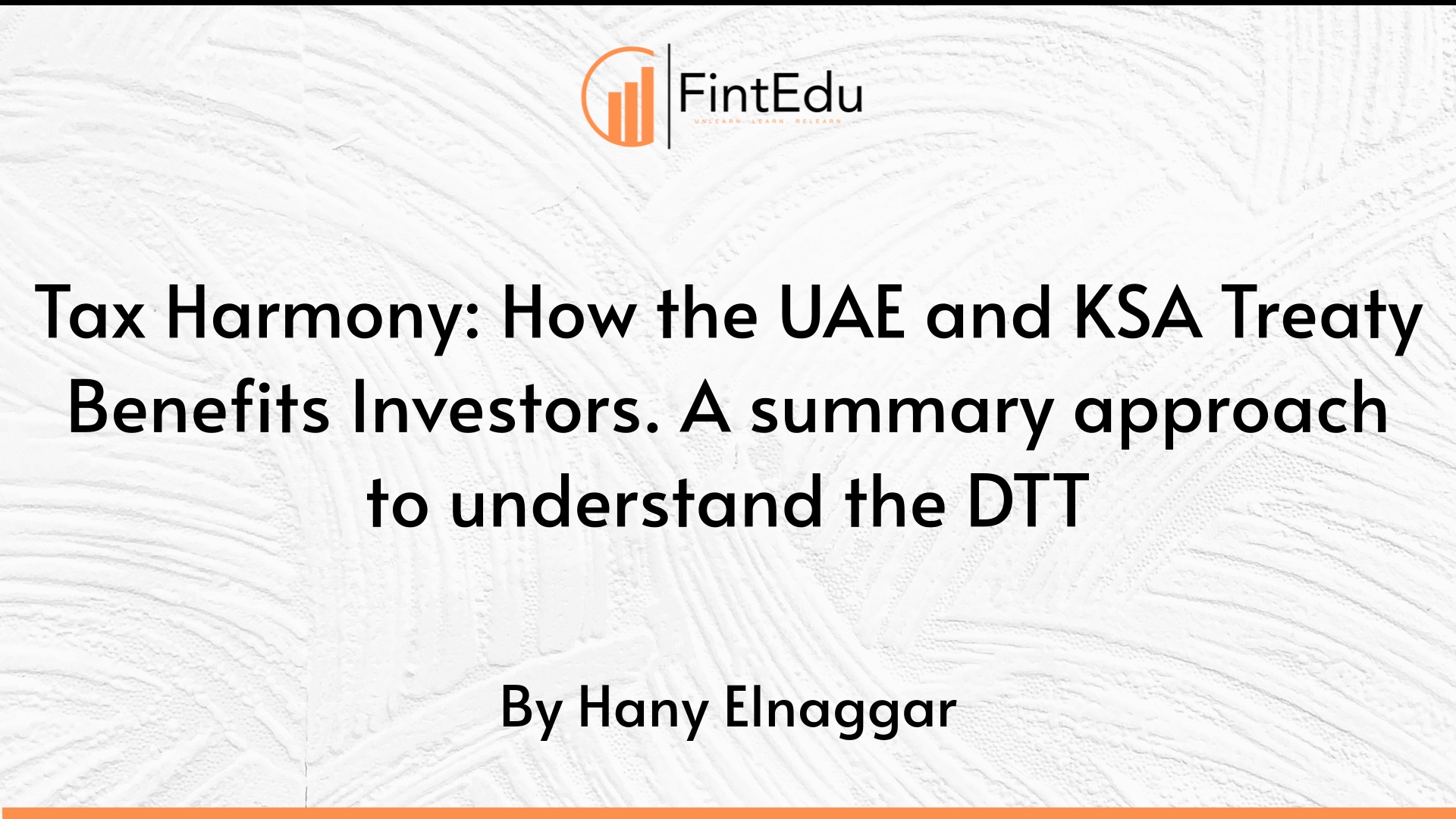LISTEN TO THIS ARTICLE
What is Withholding Tax (WHT) ?
WHT is a mechanism where tax is deducted at source from payments made to non-residents for income earned within a country (sometime on local payments as well). It serves as a tool for governments to collect taxes on outbound/inbound payments, ensuring compliance and preventing tax base erosion.
In the Middle East, including GCC countries, WHT is especially important for transactions such as dividends, interest, royalties, and service fees. The growing role of tax treaties in this region highlights the strategic need to balance tax revenue with attracting foreign investment.
Withholding Tax in the GCC: Country-by-Country Overview
1. Saudi Arabia : Withholding Tax in Saudi Arabia is primarily governed by the Saudi Income Tax Law, and it applies to payments made to non-residents for certain types of services or income.
Saudi Arabia doesn’t impose WHT on local payments. However, some outbound payments can be subject to WHT.
Withholding tax rates in Saudi Arabia generally range from 5% to 20%, depending on the nature of the income (royalties, interest, dividends, service fees, etc.).
Payments to foreign entities are subject to withholding tax, and the Saudi payer is responsible for withholding and remitting the tax.
WHT Rates:- Dividends: 5%
- Interest: 5%
- Royalties: 15%
- Payments for services (technical, consulting): 5%
- Management fees: 20%
- Other payments: 15%
Saudi Arabia has an extensive network of treaties that can reduce these rates. For instance, under some treaties, the rate for royalties may drop to 10% or lower. For interest payments may drop to 0%
2. United Arab Emirates (UAE) : Currently, The UAE does not impose WHT on outbound or inbound payments such as dividends, interest, or royalties.
Role of Tax Treaties:With over 140 tax treaties, the UAE protects residents from WHT abroad, allowing reduced rates or exemptions in partner jurisdictions.
3. Qatar : Withholding tax in Qatar is applicable on specific types of payments to non-resident entities, with a standard rate of 5% on most types of income (such as royalties, interest, and service fees)
Qatar doesn’t impose WHT on local payments. However, some outbound payments can be subject to WHT
Tax Treaty Benefits:- Treaties reduce WHT burdens significantly, but compliance requires robust documentation.
- Qatar has entered into Double Taxation Agreements (DTAs) with several countries to avoid double taxation and provide tax relief to non-residents.
- These agreements may provide for reduced WHT rates on certain types of income, such as royalties, dividends, and interest.
- Non-resident payees seeking reduced rates under a DTA must provide the required documentation to prove their entitlement to the reduced rate.
4. Kuwait : Kuwait doesn’t impose WHT on foreign or local payments. However, there is a retention tax system in place with 5%.
Based on recent developments in Kuwait, proposed tax legislation is expected to streamline WHT and introduce modern compliance mechanisms.
5. Oman : Oman doesn’t impose WHT on local payments. However, some outbound payments can be subject to WHT.
WHT Rates:WHT in Oman is applicable on several types of income, including:
- Royalties: 10%
- Interest: 10%
- Dividends: 10%
- Management fees: 10%
- Consulting and professional services fees: 10%
- Technical services fees: 10%
- Other income derived from Oman: 10%
Currently, there’s a suspension of WHT on the distribution of dividends and interest on non-resident investors.
Role of Tax Treaties:Oman has signed DTAs with several countries to prevent double taxation. These agreements may reduce the withholding tax rate on certain types of income (e.g., dividends, royalties, or interest). Non-residents who are residents of DTA countries can apply for a reduced withholding tax rate as per the terms of the relevant agreement.
6. Bahrain : Currently, Bahrain does not impose WHT. Tax treaties ensure that businesses operating in Bahrain avoid WHT in partner countries.
Applicability of Tax Treaties
DTAs between a GCC country and other country generally reduce the WHT on the following types of income:
- Dividends
- Interest
- Royalties
- Fees for technical services or consultancy services
- Other types of passive income
The reduction of WHT under a DTA depends on the specific terms of the agreement between the two contracting countries. For example, a DTA might reduce the WHT rate on royalties from the standard 15% in a country to a lower rate, such as 5% or 10%.
Country - Specific DTA Practices in the GCC
- Saudi Arabia: Saudi Arabia has a comprehensive network of DTAs with countries around the world. The treaties typically reduce WHT rates on interest to 0% and royalties to 5% or 10%, and on dividends to 5%. Saudi Arabia is known for offering favorable tax treatment to foreign investors under these agreements.
- UAE: The UAE has signed numerous DTAs with other countries, including major trading partners such as the UK, India, and many EU countries. The UAE offers no withholding tax on dividends, interest, or royalties paid to foreign investors, which makes it a highly attractive jurisdiction for international investment.
- Kuwait: Kuwait also has a network of DTAs with countries such as the USA, the UK, and India.
- Qatar: Qatar has DTAs with countries including the UK, India, and France. Dividends are generally subject to 5% WHT, and interest or royalties are subject to 5% to 10%, depending on the specific DTA.
- Bahrain: Bahrain does not impose any withholding tax on dividends, interest, or royalties. However, Bahrain does have DTAs with other countries that can provide reduced WHT rates for other types of income, such as service fees.
- Oman: Oman also has a network of DTAs that reduces the WHT on certain payments. Royalties, interest, and technical service fees are generally subject to 10% WHT, but these rates can be reduced under applicable DTAs.
Challenges in Applying Treaty Benefits
- Beneficial Ownership: Proving the recipient is the ultimate owner of the income.
- Documentation Requirements: Tax residency certificates, contracts, some countries require some forms like form Q7B in KSA and payment proofs must align with treaty provisions.
- Local Interpretation Issues: Variability in how tax authorities interpret treaties.
Conclusion
WHT remains a vital revenue tool in the GCC. While rates vary widely, tax treaties are key to reducing liabilities and fostering investment.
Disclaimer: Content posted is for informational and knowledge sharing purposes only, and is not intended to be a substitute for professional advice related to tax, finance or accounting. The view/interpretation of the publisher is based on the available Law, guidelines and information. Each reader should take due professional care before you act after reading the contents of that article/post. No warranty whatsoever is made that any of the articles are accurate and is not intended to provide, and should not be relied on for tax or accounting advice
Contributor
Related Posts

@@PLUGINFILE@@/Entertainment%20Expenses%20in%20GCC%20Taxation%20%20Guidelines%20for%20C...
Read More
@@PLUGINFILE@@/Navigating%20Real%20Estate%20Investment%20for%20Natural%20Persons%20Key%2...
Read More
@@PLUGINFILE@@/How%20the%20UAE%20and%20KSA%20Treaty%20Benefits%20Investors.%20A%20summary%20ap...
Read More